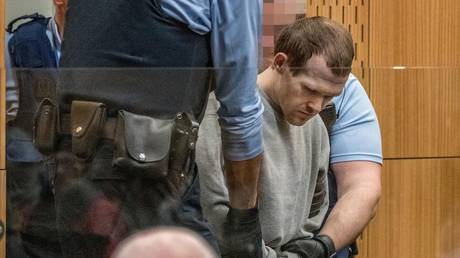
A court in Auckland will conduct a judicial review of the incarceration conditions of convicted terrorist and mass murderer Brenton Tarrant. New Zealand created a special Corrections unit to handle his life in prison.
Tarrant is a white supremacist responsible for the bloodiest mass shoting in New Zealand’s modern history. On 15 March 2019, he went on a gun rampage at two Muslim sites in Christchurch, leaving 51 people dead and 40 others injured. Last August, he was sentenced to life without parole – the first time such punishment was handed down in the country – on charges of murder, attempted murder and terrorism.
On Thursday, he is to appear before the High Court in Auckland to petition for a change to his incarceration conditions on humanitarian grounds and his designation as a “terrorist entity” under New Zealand’s Terrorism Suppression Act, the media reported citing court court authorities.
The violent spree came as a shock to New Zealand and led to some profound policy changes. One of them was the creation of the Prisoners of Extreme Risk directorate in the Department of Corrections, tasked with managing the most dangerous inmates in the country – like the Christchurch shooter.
He is kept in solitary confinement at a separate wing of a top security prison in Auckland. The wing, dubbed “prison within a prison” by the press, reportedly has 18 guards, who monitor Tarrant and two other inmates housed there separately from each other. Operation of the special detention facility is said to cost AU$2.77 million (US$2.1 million) a year.
There are however some doubts about the conditions in which Tarrant will spend the rest of his life and whether they are humane enough under New Zealand’s law. One could say that living for decades virtually alone, under strict monitoring and with no hope to ever be free again would be degrading mentally and amount to a cruel punishment. At least that’s the line of argument that some legal experts believe Tarrant may choose when he is to make his case before Justice Geoffrey Venning.
The Thursday hearing will be closed to the public, but the media will be allowed in. The judicial review will not change anything about his sentence, so in the eyes of the law Tarrant will remain a mass murderer and a terrorist, but the judge may agree to make his incarceration less restrictive.
A similar dilemma on how to treat a person who had committed a monstrous crime while remaining a humane society earlier fell on Norway. White supremacist Anders Breivik, who murdered 77 people in a spree of gun and bomb violence in 2011, was sentenced to the maximum sentence possible in the country – 21 years in jail.
He repeatedly complained about the conditions of his solitary confinement, calling them inhumane. In 2018, the European Court of Human Rights dismissed his case against the Norwegian Correctional Service.
If you like this story, share it with a friend!




